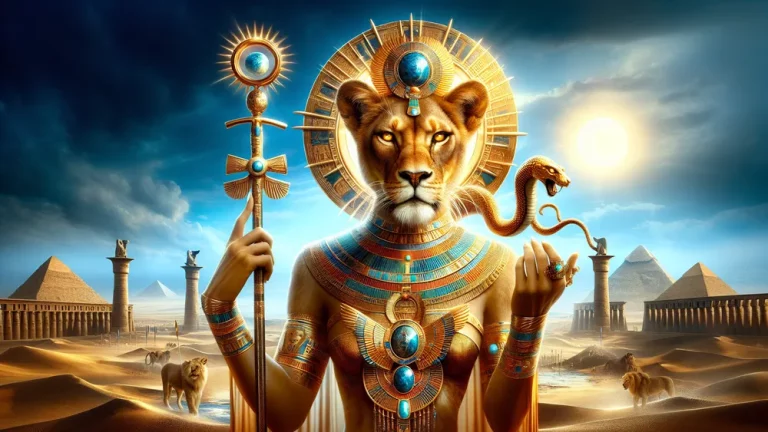Auge: The Arcadian Princess And Mother Of Hero Telephus
Greek myths are mostly about how gods and people interact. Often, people try to make choices but are pushed by things they can’t control, like prophecy. In these myths, there is a story about Auge, a princess from Arcadia. Her life had unusual hardships, meetings with gods, and survival struggles.
Key Points:
- Auge was a princess of Arcadia and a priestess of Athena, linked to gods like Zeus and Athena through her family.
- Her father, fearing a prophecy that her son would overthrow him, forced her into celibacy, but Heracles fathered her son, Telephus.
- Aleus excommunicated Auge and baby Telephus once her pregnancy was revealed, setting them adrift, but divine help ensured their survival.
- King Teuthras of Mysia rescued them, gave them a home, and raised Telephus as his own, allowing him to fulfill his heroic destiny.
- Telephus played an important role in myths, including being the key to the Greeks finding their way to Troy during the Trojan War.
- Auge’s story tells of suffering caused by gods and people alike, and it mirrors patterns of prophecy, exile, and survival seen in other myths.
- Her life mainly serves as a reminder of how humans were shaped and often harmed by destiny and divine forces.
Even though she isn’t as famous as Perseus or Achilles, Auge holds an important place in Greek stories. This is because her story connects what humans do with what gods cause. It helps you understand how prophecy drives events. People, no matter how much they try, cannot fight destiny, and their plans fall apart in the end. Born to Aleus, king of Tegea in Arcadia, her life from the start had privilege but also risk.
Arcadia, known as a wild and old part of Greece, was often said to be a place where shepherds lived and where gods showed themselves. The Olympian gods didn’t just change the lives of heroes like Heracles, but theirs too. As the child of a king and a servant to Athena, she came from a critical line. Her father was scared of a prophecy. Her son, Telephus, had a big destiny.
And meeting Heracles had a huge impact on her. But Auge’s story is confusing and hard to track because it has broken into many different versions. Was she forced to stay unmarried? Did her meeting with Heracles change her life? And was she exiles? Poets and mythographers seem to argue what really happened. In every version, though, she isn’t shown as brave or strong. Instead, she is seen as unlucky and shaped by her situation.
Her story is about betrayal, gods not caring, and motherhood. It reminds you of others like Danae or Io, who also suffered and had to bring legendary heroes into the world. These kinds of stories are filled with how gods and humans are connected, and they explain what it felt like to live under divine control.
This blog talks about Auge and everything this story means.
Auge: Overview and Key Facts
| Aspect | Details |
|---|---|
| Name | Auge (Αὐγή), which means “bright light” or “shine” in Ancient Greek. |
| Parentage | Some myths say she was the daughter of Aleus, king of Tegea, and her mother may have been Neaera. |
| Divine Lineage | Her family descended from Apheidas and linked her to Athena and Zeus as part of Arcadian royalty. |
| Role in Society | She served as a religious assistant to Athena Alea, an important position respected in her community. |
| Prophecy Involving Her | A prediction claimed her son would remove her father Aleus from power. |
| Major Event | While Heracles was staying in Arcadia, he forced himself on her, and she later had his child. |
| Child | Her son was named Telephus, who became a hero and played a role in events like the Trojan War. |
| Conflict | Her father demanded she not marry and banished her after finding out she was pregnant. |
| Exile and Survival | Auge and Telephus were sent away but managed to survive thanks to the gods, finally arriving in Mysia. |
| Rescue | King Teuthras of Mysia provided her with safety and treated Telephus as his own son. |
| Cultural Significance | Auge is remembered for themes about destiny, parents betraying their children, and gods controlling mortal lives. |
| Lasting Legacy | She is mostly known as the mother of Telephus and for the sorrows she experienced in Greek stories. |
Who Was Auge? A Look into Her Story
The life of Auge went from being a respected Arcadian princess and a priestess of Athena to something much harder – exile and hardship. Her story comes from Greek mythology, and it is one of the more complicated ones. If we really want to understand what happened, it’s necessary to look closely at her background, her role, and how her life unfolded step by step.
Her Arcadian Roots: Auge’s Divine Family Tree
The story of Auge begins in Arcadia, a region that was known for its farms, hills, and its place in myths. It was not only a quiet area with shepherds but also where gods and people often crossed paths. Auge’s father, Aleus, was the king of Tegea and a critical figure in this area.

He built a temple for Athena Alea, which helped make his kingdom an important place for honoring the gods. Because of her family’s connections, Auge’s life was tied to both mortal power and the influence of gods. Her family’s ties to Zeus meant respect, but they also came with predictions and expectations that changed her life, like the prophecy her father feared.
Family mattered a lot in Greek myths, and Auge’s family had important roots. Her father Aleus came from Apheidas, whose family was partly connected to Zeus through Arcas, a grandson of the king of the gods in Arcadian myths. Athena, the goddess of wisdom and war, was the goddess Auge served as a priestess.
Still, being close to gods didn’t stop tragedies from happening. Aleus believed a prophecy that said his grandchild would take his place as king, which made him control Auge’s life as much as he could. Later, when Auge met Heracles, who was also a son of Zeus, her story became even more tied to divine events.
Here is a simplified table of Auge’s family and their importance:
| Figure | Relationship to Auge | Mythological Importance |
|---|---|---|
| Aleus | Father | King of Tegea; built Athena Alea’s temple; part of Zeus’ lineage. |
| Neaera | Mother (in some stories) | Rarely mentioned; wife of Aleus in certain myths. |
| Zeus | Ancestor | King of the gods; part of her father’s family line. |
| Athena | Patron goddess | Worshipped in Tegea; the goddess Auge served as a priestess. |
| Heracles | Lover | Son of Zeus; father of Auge’s son, Telephus. |
| Telephus | Son | A hero in Greek myths; said to play a critical part in the Trojan War. |
Auge’s life was shaped by her family’s ties to Zeus, a prophecy her father feared about losing his throne, and her connection to gods like Athena and Heracles.
Priestess of Athena: A Great Honor or a Subtle Betrayal?
When Auge became the priestess of Athena Alea, she was seen as one of the most respected and important people in Arcadia. In ancient Greece, priestesses were not just spiritual leaders. They also had to protect the gods’ approval for their cities, so their jobs were about religion, but they were also political.
In her role as priestess at the famous temple of Athena Alea in Tegea, Auge had to perform rituals to honor the goddess who was linked to wisdom, war, and planning. For the people of Arcadia, this temple was very important. It felt like a place where gods and mortals crossed paths. However, what should have been a job that kept her safe ended up harming her instead.
Her father, Aleus, gave her this position as a way to stop her from having children because he was afraid of a prophecy. This prophecy said that his grandson, Auge’s future son, would one day take his power. By giving her this sacred job, Aleus thought he could protect himself.

He hoped he could control the prophecy itself, even though Greek myths often tell us that people can’t change what the gods have planned. Even though Auge faithfully served Athena, the goddess did not step in to protect her when things went wrong. In many other myths, gods help their followers when they are in danger. But for Auge, Athena stayed silent.
This has made people wonder why Athena didn’t act. Some think that this silence shows how gods could give favor but then stay distant when mortals needed them most. This isn’t the first time a god ignored someone. For instance, Io suffered, even though she was connected to Zeus. Myths like these remind us how uncertain life was for mortals.
Even when gods were involved, their help wasn’t something you could count on. For Auge, Athena’s absence during her struggles adds to the sadness of her story. It clearly shows how unpredictable the gods could be and how dangerous their silence was for mortals.
The Challenges Auge Faced: Prophecy and the Gods’ Influence
The events in Auge’s life were controlled mostly by prophecy and the impact of gods and people. Because of these forces, her fate was no longer her own. Prophecy could not be ignored in those times, especially when it involved the powerful Greek gods. If we think about her story, it’s easy to see how everything connected and led to her hardest struggles.
These things happened because her life was surrounded by divine power and mortal decisions. And in the end, these choices brought her the greatest challenges she ever had to endure.
Aleus and the Prophecy: A Predictable Spiral of Fear
Like many other rulers in Greek myths, Aleus became trapped in a hopeless effort to work against the gods. His fears caused many bad things, one after the other. An oracle gave the warning: Aleus would lose his power as king because of a grandson. This grandson would be born to his daughter, Auge. Hearing this, Aleus grew desperate. He tried several ways to stop the prophecy from happening.
The plan he saw as most important was simple but extreme. He made Auge take a position as a priestess in Athena Alea’s temple. Because this position required her to stay celibate, Aleus believed it meant his problem was solved. But he was wrong. When Heracles, the son of Zeus, came to Tegea, Aleus’ careful planning fell apart.
His actions, ironically, made the prophecy come true even faster. Aleus’ attempt to escape what fate had planned connects his story to many others in Greek mythology. There was Acrisius, a king in Argos, who locked his daughter Danae in a bronze room underground.

He hoped this would keep her from having the grandson who was predicted to kill him, but it was all for nothing. Zeus came to Danae, Perseus was born, and the prophecy was fulfilled. Another tragic king was Laius, who abandoned his son Oedipus to avoid a similar prophecy. In the end, Oedipus unknowingly caused Laius’ death.
Here is a list of rulers whose fear of prophecy caused tragedy:
- Aleus (Arcadia): Tried to prevent his grandson Telephus from being born by forcing his daughter Auge into chastity.
- Acrisius (Argos): Locked Danae away, but Zeus fathered Perseus, who later killed Acrisius accidentally.
- Laius (Thebes): Ordered his son Oedipus to be left to die, only for Oedipus to return and unknowingly kill him.
- Astyanax’s Grandfather (Troy): Feared a prophecy saying Hector’s son would cause his death in certain stories.
These stories explain a strange pattern in Greek mythology: when people tried to change what the gods had decided, they only made it happen faster.
Auge and Heracles: A Chaotic Encounter with Dire Results
The meeting between Auge and Heracles was a significant and tragic moment in her life. It happened because of actions by the gods and mistakes made by people. Heracles, known as the son of Zeus and famous for his amazing tasks, stopped in Tegea. Some say he came because of his divine duties, but others believe the gods had temporarily interrupted his journey.
While staying there, he met Auge, who at the time was serving as a priestess in Athena Alea’s temple. It is said that Heracles, either as a result of the gods’ influence or his own unchecked desires, hurt Auge, which resulted in her secretly becoming pregnant. This event clearly explains Heracles’ two sides.
He was celebrated as a hero who completed great tasks for the gods. But at the same time, he caused serious harm to people, and in this case, left a huge scar on Auge’s life. Even though he was the son of Zeus and seen as extraordinary, what he did to Auge was destructive, not helpful.
Keeping her pregnancy a secret made things much worse later. When her father, Aleus, eventually found out the truth, he didn’t focus on what had happened to his daughter. Instead, he feared that the prophecy – that his grandson would one day overthrow him – was beginning to come true. Because of his panic, he made terrible choices.
Some versions of the story say he tried to kill Auge, while others suggest he sent her away, hoping to stop the prophecy from happening. Much of Auge’s suffering was tied to actions by the gods and the prophecy. This story shows how, in Greek myths, human lives were often controlled by divine plans.
For Auge, everything that happened was out of her control. The prophecy, Heracles’ actions, and her father’s response all created a chain of events that showed how often people were helpless in the face of the gods’ power. This moment didn’t just confirm the prophecy but also set up what was to come for her son, Telephus.
Exile and Survival: Auge’s Fight to Keep Going
When Auge’s secret was discovered, and her father’s anger turned intense, her life took a completely different direction. What followed was a time of mistreatment and banishment. Now, we can look at what happened during this difficult part of her life, how she and her son Telephus had to face those challenges, and what helped them keep going through it all.
Set Adrift: Auge and Telephus’ Journey of Survival
When Aleus found out about Auge’s pregnancy, his anger and fear of the prophecy made him act without mercy. He ordered that his daughter and her newborn son, Telephus, be left to die. In some myths, they were shut inside a chest and sent into the sea. This kind of punishment, sending someone away by sea or into the wilderness, is something you can find in many Greek myths.
It often meant despair for those abandoned but offered a chance for survival. Other versions of the story say Auge was excommunicated or banished, though the exact details are unclear. Whichever way the story is told, the cruelty they experienced was undeniable.
Aleus’ actions are seen by many as the result of his fear of what the gods had foretold, rather than choices he could fully control. Life for Auge and Telephus was by no means easy after this. Drifting aimlessly in an ancient world where survival was nearly impossible, they seemed to have no hope. But when people failed them, the gods intervened.

They arrived in Mysia, where they were saved, thanks to the kindness of others and the unseen help of the gods. This divine help ensured that Telephus, who was meant to have a vital future, would live to fulfill his destiny. Stories of mothers excommunicated or cast out for having extraordinary children are not unusual in Greek myths.
Danae, for instance, was locked inside a chest with her infant son, Perseus, and sent to sea by her father, Acrisius, hoping to escape the prophecy that Perseus would one day kill him. Similarly, Io was punished by Hera, turned into a cow, and forced to wander alone, only finding peace when Zeus stepped in.
Here are some examples of exiles in mythology and what came of them:
- Auge and Telephus: Set afloat by Aleus but saved by divine help, then protected in Mysia.
- Danae and Perseus: Sent to sea in a chest by Acrisius but rescued on Seriphos, where Perseus grew up as a hero.
- Io: Turned into a cow by Hera and sent to wander alone, later freed with Zeus’ help.
- Andromeda: Left chained to a rock as a sacrifice but saved by Perseus, who became her husband.
You can see a clear pattern in myths like these: even though exile often caused terrible suffering, it was also the moment where lives changed, shaped by help from the gods, and where destiny began to take shape.
Aleus abandoned Auge and Telephus out of fear of a prophecy, but divine help saved them, reflecting a common theme in Greek myths where exile brings suffering but also leads to a destined future.
A Saving Hand: How King Teuthras Changed Her Story
Auge’s life was torn apart because of her father’s cruelty. But things began to change when she and her baby, Telephus, were saved by King Teuthras of Mysia. In the myths, Teuthras found Auge and her child after they survived against impossible odds. He gave them safety in his land and treated them as family.
Some stories say that because their story seemed important and tied to the gods, Teuthras adopted Auge as his own daughter. He also took Telephus into his care, raising the boy and making sure he stayed safe. This act of kindness was a big moment in Greek stories. It shifted Auge’s life from being filled with pain and exile to a time of stability and recovery.
Unlike Aleus, who acted out of fear, Teuthras responded with care and generosity. His actions show that even when the gods caused suffering, human compassion could still help those who needed it. When comparing Teuthras and Aleus, you can see two completely opposite types of kings. Aleus was controlled by fear and tried to destroy his family because he wanted to protect his power.
Teuthras, on the other hand, welcomed strangers without thinking about how it would affect himself. By helping Auge and Telephus, he revealed how human kindness could change the path of someone’s life, even when the gods had already interfered. For Auge, Teuthras wasn’t just someone who saved her.
He became a symbol that even in a time of pain and suffering, a small act of kindness could offer her a chance at peace and a new future.
Telephus: A Life Born Out of Struggle
Because King Teuthras helped him, Telephus was able to grow and begin fulfilling what the gods had predicted for him. His life, which started with many difficulties and challenges, shaped the person he was meant to become. Now, let us find out about how these hardships turned him into someone important in myth.
Telephus’ Path: Shaped by Hardship and Fate
While living in Mysia, Telephus was shaped by the difficult challenges he experienced early on and the help he received from King Teuthras. Even though his father was Heracles, one of the most well-known heroes in Greek stories, Telephus’ birth brought trouble and sadness. Both he and his mother were sent away from their homeland.
With Teuthras’ protection, he grew up in a royal home, but he couldn’t escape the shame tied to the story of his birth. Over time, as a young man, the gods began to have a bigger impact on his life. Some myths describe how he searched for the truth about who he was by following what an oracle told him.
His story is one of learning about himself and pushing through hard times. Eventually, people saw him as an important figure in the myths about the Trojan War. According to the gods, the Greeks would not be able to win against Troy unless they had his help. This prediction made him someone they couldn’t ignore.
Many Greek stories mention characters like Telephus, where people face tough beginnings but go on to do great things later. The life of Telephus is a lot like those of other well-known heroes. Perseus, for example, was sent away at sea with his mother, Danae, but later became famous for killing Medusa and rescuing Andromeda.
In another example, Theseus, who was left by his father, had to deal with danger before becoming the leader of Athens. And Heracles himself, who was Telephus’ father, had to go through many challenges because of the anger of Hera, finally becoming one of the most famous heroes of all.
Here is a list of well-known figures who grew stronger because they overcame struggles:
- Telephus: Born into trouble and sent away, he grew up to become the key to Troy falling, just as predicted.
- Perseus: Survived being left at sea, killed Medusa, and saved Andromeda.
- Theseus: Was abandoned but later became the great leader of Athens.
- Heracles: Suffered many hard tasks because of Hera but became one of the greatest Greek heroes.
These characters mean one thing: hard times often create the strength people need to achieve great things, a lesson that you can see in how Telephus moved from exile to becoming a hero.
Pantheon of Arcadian Abstract and Natural Forces
The mythology of Arcadia is deeply connected to how ideas and nature mix, showing a place where gods, people, and the natural world all seemed tied together. In Arcadian stories, these forces are often seen as gods, which means they changed not only how mortals like Auge and Telephus lived but also had an impact on the larger stories in mythology.
For example, Gaia, who represented Earth, was nurturing and protective, while Ananke, or Necessity, controlled destiny in an unchanging way. Arcadian myths used these figures to explain deeper meanings in human life and history. If you want to know more about these forces and their roles in Greek mythology, check out this list of all the Greek Abstract and Natural Forces. It includes both older deities and what they symbolized.
These characters help to explain how balance was seen as important – between chaos, order, and how people thought about the gods.
FAQs
1. How Did Prophecy Control the Lives of Auge and Aleus?
Prophecy controlled the lives of Auge and Aleus by driving Aleus’ obsessive attempts to prevent its fulfillment, which directly shaped Auge’s tragic fate and Telephus’ eventual destiny.
2. What Makes Telephus’ Connection to the Trojan War Significant?
What makes Telephus’ connection to the Trojan War significant is his role as the wounded hero whose knowledge of the route to Troy was essential for the Greeks to launch their expedition.
3. Was Auge Ever Revered in Arcadian Culture or Mythology?
Auge was not widely revered in Arcadian culture or mythology, as her story primarily served to highlight themes of divine prophecy and human suffering rather than glorify her character.
4. Why Is Heracles Portrayed Contradictorily in Auge’s Story?
Heracles is portrayed contradictorily in Auge’s story because, as both a celebrated hero and a bringer of tragedy, he embodies the dual nature of divine influence in Greek mythology.







